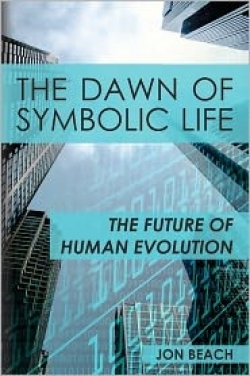The Dawn of Symbolic Life
The Future of Human Evolution
Jon Beach’s The Dawn of Symbolic Life is a dense, but interesting book that encapsulates the author’s long-term analysis of mankind’s history and future. Beach takes a comprehensive look at the human race, seeing it as an organism that has come to dominate all other earthly life forms. He helps readers understand living things as machines that respond to the laws of biology and thermodynamics and take in random energy to create structures that enable them to survive, grow, and reproduce. When there are changes in the feedback loops of energy transformation, new structures are created that make life increasingly complex and/or different; in other words, we evolve.
Humans developed the evolutionary advantage of greater information storage and retrieval when language and writing systems were invented. These tools gave our species a huge collective memory, which led to our dominance over other species. Beach’s view is that humankind is on the verge of making another huge evolutionary leap forward toward eventual colonization of and wider understanding of the universe. He indicates that rapid technological advances, particularly in biotechnology and computers, will give humans more efficient ways to use all renewable and nonrenewable energy sources and keep from overrunning our earthly habitat.
Not every reader will agree with the author’s optimism about energy advances progressing ahead of human overpopulation and resource depletion. Environmentalists might argue that the earth has reached a tipping point which we may not be able to invent ourselves out of in time. Similarly, there are probably many who might not want to walk down an evolutionary path that requires subjugation of the individual to collective cooperation in seeding the universe with human colonies. (Fans of the 1990s’ sci-fi television series, Star Trek: The Next Generation will recognize shades of the Borg—aliens with the mantra, “Resistance is futile. You will be assimilated” and a wired-in reliance on each other to colonize the galaxy with their roboto-human form of life.)
There are a lot of ideas to chew on in these pages, but the writing style is clean and easy to follow. There are many simple and helpful illustrations to keep the reader engaged, even as the abstract nature of the concepts themselves requires frequent stops and starts for thorough understanding. Reading Beach’s text is like reading philosophy or poetry, and it can be slow going for readers who are not familiar with the many scientific and philosophic theories he weaves together. While jargon is largely avoided, certain words and phrases are used over and over again, such as “symbolic genome” and “information,” which appears in nearly every sentence; this makes the prose less lively than it could be.
The Dawn of Symbolic Life is a good introduction to the way humankind might progress in the future and a thought-provoking and well-researched blend of science and philosophy that will leave readers wondering what lies ahead for future generations. The author raises many provocative questions about the role of religion and government in securing evolutionary advantages for our species, the possibility of computer consciousness, and the replication of human beings as strings of information code. Certainly, this book would be a good fit in any popular science collection and is a welcome addition to man’s symbolic genome.
Reviewed by
Rachel Jagareski
Disclosure: This article is not an endorsement, but a review. The publisher of this book provided free copies of the book and paid a small fee to have their book reviewed by a professional reviewer. Foreword Reviews and Clarion Reviews make no guarantee that the publisher will receive a positive review. Foreword Magazine, Inc. is disclosing this in accordance with the Federal Trade Commission’s 16 CFR, Part 255.

